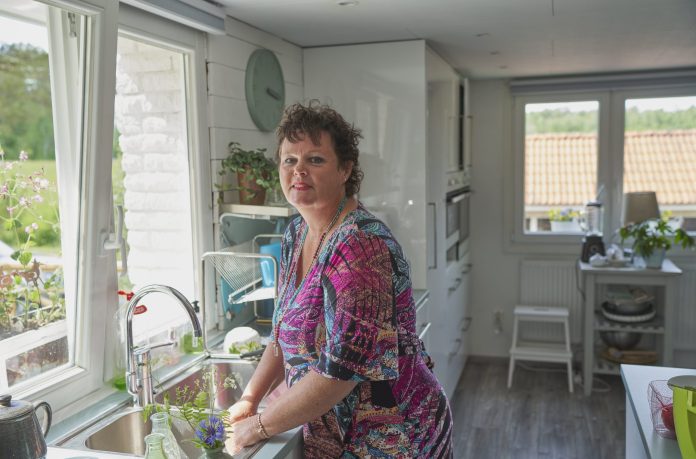June 2020 Stillingsön/Uppsala Sweden
Invandrare
“The little swelling in my neck bothered me for some time already but my colleagues said it was nothing. I work in a hospital and they are doctors so I thought they knew. In the end, they said: ok, let’s take a punction and check. It turned out to be thyroid cancer. Luckily this type of cancer is the best one to get but it resulted in two operations and radiotherapy. It forced me to sleep alone in the gästestuga (guesthouse as very common in Sweden). But I take life day by day so I was not worried”
 Linda emigrated from The Netherlands to Sweden. It was a very conscious decision. Sweden has space and a much more relaxed way of life. Her husband has his own business in specialized shipbuilding techniques and she is a qualified nurse. The move was well planned and prepared (they already had a summerhouse near Uddevalla). Linda feels life should be enjoyed and is full of small moments of happiness she expected to find more here.
Linda emigrated from The Netherlands to Sweden. It was a very conscious decision. Sweden has space and a much more relaxed way of life. Her husband has his own business in specialized shipbuilding techniques and she is a qualified nurse. The move was well planned and prepared (they already had a summerhouse near Uddevalla). Linda feels life should be enjoyed and is full of small moments of happiness she expected to find more here.
“We came to live here permanently in 2011. Michel started his company on July 1, 2010. We live here mainly because we feel the sense of freedom so clearly. The individual is central here and you may be who you are!” For the Dutch emigrants, the freedom and nature of this large Nordic country is the big pull factor so their chosen destination is often in the countryside. They feel The Netherlands is “full”. Around 1000 of Dutch emigrate to Sweden per year. They are just a fraction of the total of around 70.000 emigrants that leave The Netherlands and about 1% of the immigrants to Sweden. This number is rising and has doubled compared to before 9/11. Some 11.000 live here now, most of them permanently. A small fraction returns as their expectations are not fulfilled.S
For the Dutch emigrants, the freedom and nature of this large Nordic country is the big pull factor so their chosen destination is often in the countryside. They feel The Netherlands is “full”. Around 1000 of Dutch emigrate to Sweden per year. They are just a fraction of the total of around 70.000 emigrants that leave The Netherlands and about 1% of the immigrants to Sweden. This number is rising and has doubled compared to before 9/11. Some 11.000 live here now, most of them permanently. A small fraction returns as their expectations are not fulfilled.S
In some rural area’s there are even complete Dutch communities. The Swedes are intrigued by this behavior and some academic studies where conducted into the phenomenon. An investigation of The University of Linköping came to the conclusion that:
“Dutch participants (in the study) seem to separate themselves from the Swedes and at the same time they want to integrate. In some contexts, the Dutch immigrants identify themself as a Dutch person and in other contexts, they identify more as a Swedish person.”
Which in part explains the “sticking together” attitude (which may be not uniquely Dutch by the way).
The number of immigrants from The Netherlands is a lot smaller than those from Finland, Germany, Danmark, and Norway. Source.
The Swedes are generally happy with Dutch as they bring their own skills and are seen as enterprising. Swedish communities, especially in areas that experience depopulation (for example Hällefors), actively search for Dutch immigrants. Like a lot of West European countries, Sweden suffers from an aging population and a faltering birth rate. Also, there is a shortage in a lot of professions like healthcare, again especially in just those depopulating areas that attract the Dutch.
One of Linda’s three daughters Valery (20) is equally positive about her new life here. At first, it was difficult though: “I remember I was so tired as everything had to be done in Swedish. Language education was very well organized and free of cost. We actually received a bonus for passing the A2 level. And free computer notebooks. After less than a year I could go to the regular Swedish school and follow all lessons without a problem.
Now I feel half Swedish. Though the Mittsommar celebrations do not appeal to me. I like the way people behave though often they still find me too direct. Swedes avoid conflict and generally do not express their views too openly (which is a national hobby in The Netherlands). But they know me and from me, they often accept it (ah, it is this Dutch girl, ok we understand)”.
 A lot of Dutch emigrants end up in the tourism business, where their international character is appreciated. Right now Valery works on a camping place in Stocken on the Island Orust, in the reception area where her language skills are highly appreciated. Her English is also excellent because she is also a tour guide for TUI. “No, I would not like to return, life is good here and facilities for e.g. study (free) are perfect”.
A lot of Dutch emigrants end up in the tourism business, where their international character is appreciated. Right now Valery works on a camping place in Stocken on the Island Orust, in the reception area where her language skills are highly appreciated. Her English is also excellent because she is also a tour guide for TUI. “No, I would not like to return, life is good here and facilities for e.g. study (free) are perfect”.
In Uppsala, it is quiet on the streets in the center. These are corona times… Along the central Fyrisån river boulevard, people sit at distance and enjoy the early summer. The bustling city life around the Sala river to just a fraction of what it normally is. A friendly smile catches my eye.
 Two sisters on a bench represent a totally different category of immigrants. They come from Syria (at his moment the largest group) and do not like to be mentioned by name. It is 5 years ago now they went to Sweden. They did well, their Swedish is better than mine due to the perfect facilities of the Swedish state. Our conversation is in English. The elder sister will graduate as a dentist this year.
Two sisters on a bench represent a totally different category of immigrants. They come from Syria (at his moment the largest group) and do not like to be mentioned by name. It is 5 years ago now they went to Sweden. They did well, their Swedish is better than mine due to the perfect facilities of the Swedish state. Our conversation is in English. The elder sister will graduate as a dentist this year.
Their father went a few years before them to Sweden and settled as a professional architect before the family joined him. They are lucky as they were well educated and could hook up to the Swedish education system very quickly. “At first I hated the Swedish language as I was forbidden to speak English and I mixed up a lot of words”. False friends this is called in linguistics. Now she is fluent (at least for my ears).
 They feel at home here and have only praise for their new homeland. “Uppsala is a great city. When I feel sad I go to the fortress-palace that dominates the skylight and look out in the distance and think of home. We did not want to leave but life became impossible in Syria. Moving here gave us a long time perspective again. It comes at a cost, we left out of desperation, but we never regretted it.”
They feel at home here and have only praise for their new homeland. “Uppsala is a great city. When I feel sad I go to the fortress-palace that dominates the skylight and look out in the distance and think of home. We did not want to leave but life became impossible in Syria. Moving here gave us a long time perspective again. It comes at a cost, we left out of desperation, but we never regretted it.”
Most immigrants I ask, also or even especially those with a refugee background, are extremely positive about life in Sweden. The country needs them and that is what they feel, though racism and rightwing movements are also very present here. The state however has a vision and the citizens respect this as they did with the corona measures. Sometimes the state is wrong but also then this is accepted as a better attitude than the constant fight with authority as we have in The Netherlands.
The positive attitude to immigrants wears out, however. In the last 4 years their number of hovers around 100 – 150.000 per year (around half of the number of immigrants into The Netherlands). This is about double or even four times the number from the years before, mainly due to the rising number of refugees coming for asylum (and not for a change of life). This has created increased tensions in the Swedish community.
The priority of the girls in Uppsala is to master Swedish so well they cannot be heard to be immigrants anymore. Only then they will have a chance to truly be one of them, they realize.
Linda’s cancer has been defeated completely she let me know and her dream can continue here in her new homeland. However: “I will always be Dutch at heart, that will not change”
 Or with as a quote from the Linköping University study expresses it:
Or with as a quote from the Linköping University study expresses it:
”Vi kommer alltid att vara immigranter”
we will always stay immigrants.
Read More on this subject in “Mieps Huset”.


















